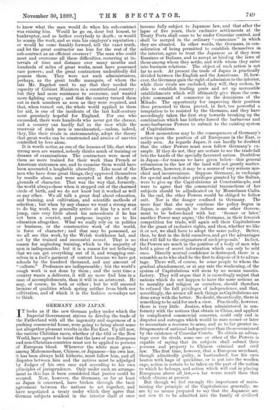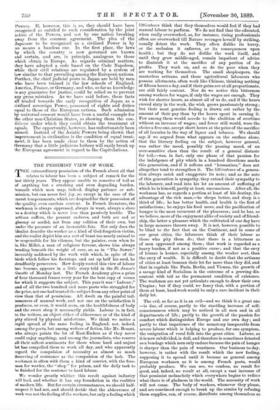GERMANY AND JAPAN.
IT looks as if the new German policy under which the Imperial Government strives to develop the trade of the Fatherland with all the ingenuity and. eagerness of a pushing commercial house, were going to bring about some not altogether pleasant results in the Far East. Up till now, the various Christian races, whether of the Old or the New World, have agreed. to insist that the laws of non-European and non-Christian countries must not be applied to persons of European blood. Wherever the white man goes— among Mahommedans, Chinese, or Japanese—his own law, it has been always held hitherto, must follow him, and. all disputes between him and the natives must be adjudged by Judges of his own race and according to his own principles of jurisprudence. Only under such an arrange- ment as this has it been considered that justice could. be secured. Now, however, the Germans, as far at least as Japan is concerned, have broken through the tacit agreement between the nations to act together, and have negotiated a treaty under which they agree that German subjects resident in the interior shall at once become fully subject to Japanese law, and that after the lapse of five years, their exclusive settlements at the Treaty Ports shall cease to be under Consular control, and shall be merged in the ordinary " communes " in which they are situated. In other words, the Germans, in con- sideration of being permitted to establish themselves in the interior, agree to treat the Japanese as if they were Russians or Italians, and to accept as binding the laws of those among whom they settle, and with whom they enter into business relations. The object of such action is not far to seek. At present the trade of Japan is practically divided between the English and the Americans. If, how- ever, the Germans gain the right of admission to the interior, while their rivals are excluded, they will, they reckon, be able to establish trading posts and set up mercantile establishments which will ultimately give them the com- plete command of commerce in the dominions of the Mikado. The opportunity for improving their position thus presented. to them proved, in fact, too powerful a, temptation to be resisted by the Germans, and they have accordingly taken the first step towards breaking up the combination which has hitherto forced the barbarous and semi-barbarous Powers to submit to the existing system of Capitulations. How momentous may be the consequences of Germany's action upon the position of all Europeans in the East, is easily seen. As regards Japan, it can hardly be doubted that the other Powers must soon follow Germany's ex- ample. If they do not, they are certain to see the trade fall into the hands of the specially favoured nation. Doubtless in Japan—for reasons we have given below—this general submission to the law of the land will not greatly matter. Elsewhere, however, it may be a source of very serious mis- chief and inconvenience. Suppose Germany, in exchange for special and. exclusive privileges granted by the Sultan, were to give up the Capitulations at Constantinople, and were to agree that the commercial transactions of her subjects should be adjudicated on by Mussulman Cadis. In the end, the other Powers would be obliged to follow suit. Nor is the danger confined to Germany. The mere fear that she may continue the policy begun in Japan, is quite enough to induce some other Govern- ment to be before-hand with her. Sooner or later,' another Power may argue, the Germans, in their feverish competition for trade, will again sell their Capitulations for the grant of exclusive rights, and then, whether we like it or not, we shall have to adopt the same policy. Better, then, be first in the field ourselves, and get the advantages that will fall to the originators of such proposals.' In fact, the Powers are much in the position of a body of men who hold a piece of secret information which can only be sold once. Directly mutual confidence is destroyed, there is a scramble as to who shall be the first to dispose of it to advan- tage. There will, of course, be some people to whom the gradual abandonment, or at any rate the weakening, of the system of Capitulations will seem by no means unsatis- factory. They will argue that it is exceedingly unjust that nations which do not happen to have the same notions as to morality and religion as ourselves, should therefore be refused the full privileges of independence, and that, accordingly, the sooner all such things as Capitulations are done away with the better. No doubt, theoretically, there is something to be said for such a view. Practically, however, there is very little. Justice, when administered in con- formity with the notions that obtain in China, and applied to complicated commercial concerns, could only end in disputes and outrages which would be sure sooner or later to necessitate a recourse to arms, and so to far greater in- fringements of national independence than those occasioned by the existence of Consular Courts. To obtain an advan- tage over its rivals, some one or other of the Powers is capable of saying that its subjects shall submit their persons and property to Chinese criminal and civil law. The first time, however, that a European merchant, though admittedly guilty, is bastinadoed, has his eyes beaten with bags of quicklime, or is put into the wooden cage, action is certain to be taken on the part of the nation to which he belongs, and action which will end in placing Europeans above all .law,—a far worse result than that which obtains at present. But though we feel strongly the importance of main- taining the principle of the Capitulations generally, we are by no means prepared to say that the Japanese are not now fit to be admitted into the family of civilised Powers. If, however, this is so, they should have been recognised as entitled to such consideration by the joint action of the Powers, and not by one nation breaking away from the common agreement. The plea of the Japanese to be recognised as a civilised Power is by no means a baseless one. In the first place, the laws by which the country is now governed are known and certain, and are, in principle, analogous to those which obtain in Europe. As regards criminal matters, they have adopted a code based on the Code Napoleon, while their civil relations are regulated by a system of law similar to that prevailing among the European nations. Further, the chief judicial posts in Japan are held by men who have been trained in the law schools of England, America, France, or Germany, and who, so far as knowledge is any guarantee for justice, could be relied on to prevent any gross mistakes. As we have said before, these facts all tended towards the early recognition of Japan as a eivilised sovereign Power, possessed of rights and duties equal to those of the European nations. Such admission by universal consent would have been a useful example for the other non-Christian States, as showing them the con- ditions under which they could obtain the treatment of equals. The opportunity, however, has unfortunately been missed. Instead of the Asiatic Powers being shown that improvement in civilisation is the condition of equal treat- ment, it has been made clear to them by the action of Germany that a little judicious bribery will easily break up the European agreement in regard to the Capitulations.







































 Previous page
Previous page